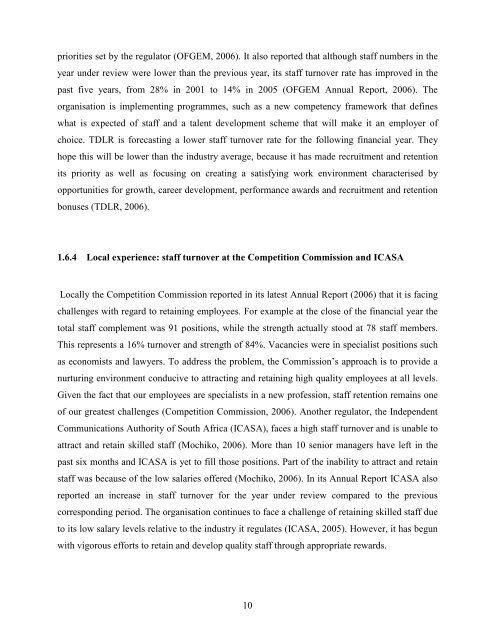Thami Nompula MBA Dissertation March 2007 - Rhodes eResearch ...
Thami Nompula MBA Dissertation March 2007 - Rhodes eResearch ...
Thami Nompula MBA Dissertation March 2007 - Rhodes eResearch ...
You also want an ePaper? Increase the reach of your titles
YUMPU automatically turns print PDFs into web optimized ePapers that Google loves.
priorities set by the regulator (OFGEM, 2006). It also reported that although staff numbers in the<br />
year under review were lower than the previous year, its staff turnover rate has improved in the<br />
past five years, from 28% in 2001 to 14% in 2005 (OFGEM Annual Report, 2006). The<br />
organisation is implementing programmes, such as a new competency framework that defines<br />
what is expected of staff and a talent development scheme that will make it an employer of<br />
choice. TDLR is forecasting a lower staff turnover rate for the following financial year. They<br />
hope this will be lower than the industry average, because it has made recruitment and retention<br />
its priority as well as focusing on creating a satisfying work environment characterised by<br />
opportunities for growth, career development, performance awards and recruitment and retention<br />
bonuses (TDLR, 2006).<br />
1.6.4 Local experience: staff turnover at the Competition Commission and ICASA<br />
Locally the Competition Commission reported in its latest Annual Report (2006) that it is facing<br />
challenges with regard to retaining employees. For example at the close of the financial year the<br />
total staff complement was 91 positions, while the strength actually stood at 78 staff members.<br />
This represents a 16% turnover and strength of 84%. Vacancies were in specialist positions such<br />
as economists and lawyers. To address the problem, the Commission’s approach is to provide a<br />
nurturing environment conducive to attracting and retaining high quality employees at all levels.<br />
Given the fact that our employees are specialists in a new profession, staff retention remains one<br />
of our greatest challenges (Competition Commission, 2006). Another regulator, the Independent<br />
Communications Authority of South Africa (ICASA), faces a high staff turnover and is unable to<br />
attract and retain skilled staff (Mochiko, 2006). More than 10 senior managers have left in the<br />
past six months and ICASA is yet to fill those positions. Part of the inability to attract and retain<br />
staff was because of the low salaries offered (Mochiko, 2006). In its Annual Report ICASA also<br />
reported an increase in staff turnover for the year under review compared to the previous<br />
corresponding period. The organisation continues to face a challenge of retaining skilled staff due<br />
to its low salary levels relative to the industry it regulates (ICASA, 2005). However, it has begun<br />
with vigorous efforts to retain and develop quality staff through appropriate rewards.<br />
10

















